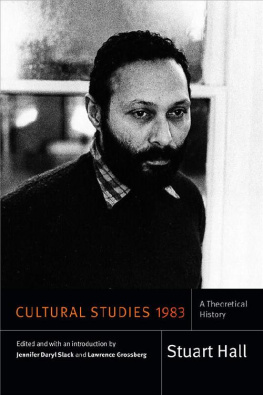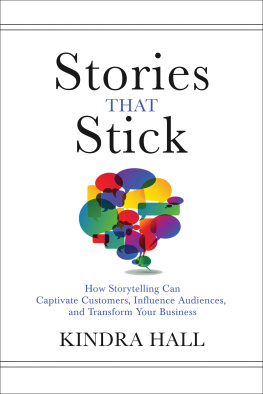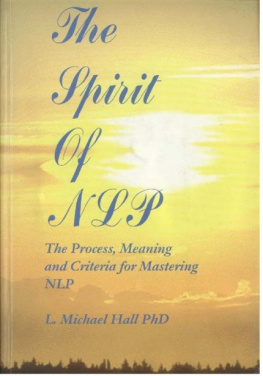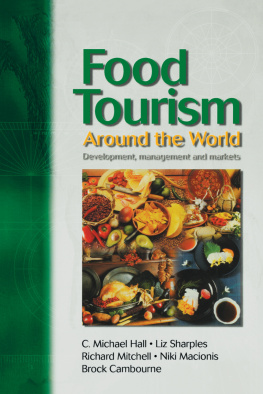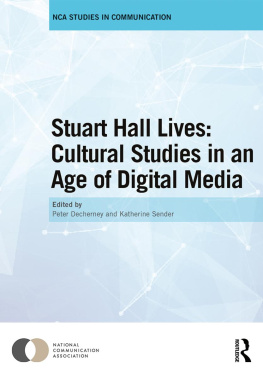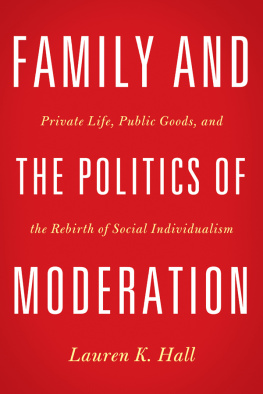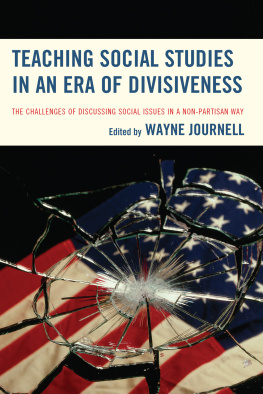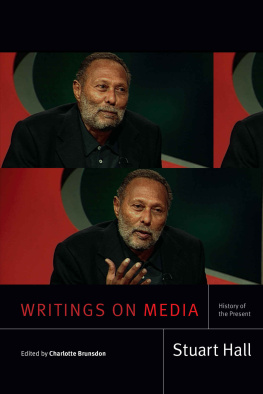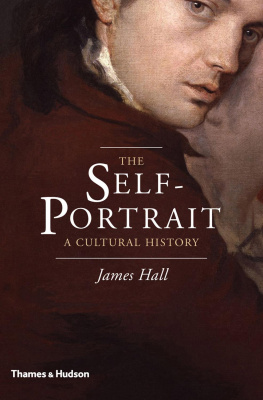Hall - Cultural Studies 1983
Here you can read online Hall - Cultural Studies 1983 full text of the book (entire story) in english for free. Download pdf and epub, get meaning, cover and reviews about this ebook. year: 2016, publisher: Duke University Press, genre: Science / Art. Description of the work, (preface) as well as reviews are available. Best literature library LitArk.com created for fans of good reading and offers a wide selection of genres:
Romance novel
Science fiction
Adventure
Detective
Science
History
Home and family
Prose
Art
Politics
Computer
Non-fiction
Religion
Business
Children
Humor
Choose a favorite category and find really read worthwhile books. Enjoy immersion in the world of imagination, feel the emotions of the characters or learn something new for yourself, make an fascinating discovery.
Cultural Studies 1983: summary, description and annotation
We offer to read an annotation, description, summary or preface (depends on what the author of the book "Cultural Studies 1983" wrote himself). If you haven't found the necessary information about the book — write in the comments, we will try to find it.
Hall: author's other books
Who wrote Cultural Studies 1983? Find out the surname, the name of the author of the book and a list of all author's works by series.
Cultural Studies 1983 — read online for free the complete book (whole text) full work
Below is the text of the book, divided by pages. System saving the place of the last page read, allows you to conveniently read the book "Cultural Studies 1983" online for free, without having to search again every time where you left off. Put a bookmark, and you can go to the page where you finished reading at any time.
Font size:
Interval:
Bookmark:
Stuart Hall: Selected Writings
A series edited by Catherine Hall and Bill Schwarz
CULTURAL STUDIES 1983 | A Theoretical History |
Edited and with an introduction by | Stuart Hall |
DUKE UNIVERSITY PRESS | DURHAM AND LONDON | 2016
2016 Stuart Hall Estate
Introduction 2016, Duke University Press
All rights reserved
Printed in the United States of America on acid-free paper
Designed by Amy Ruth Buchanan
Typeset in Minion Pro and Meta by Westchester Publishing Services
Library of Congress Cataloging-in-Publication Data
Names: Hall, Stuart, [date], author. | Slack, Jennifer Daryl, editor. | Grossberg, Lawrence, editor. | Hall, Stuart, [date]. Works. Selections. 2016.
Title: Cultural studies 1983 : a theoretical history / Stuart Hall ; edited and with an introduction by Jennifer Daryl Slack and Lawrence Grossberg.
Description: Durham : Duke University Press, 2016. | Series: Stuart Hall, selected writings | Includes bibliographical references and index.
Identifiers:LCCN2016020794 (print)LCCN2016022037 (ebook)
ISBN9780822362487 (hardcover : alk. paper)
ISBN9780822362630 (pbk. : alk. paper)
ISBN9780822373650 (e-book)
Subjects:LCSH: CultureStudy and teaching. | Critical theory. | Social sciencesPhilosophy.
Classification:LCC HM623.365 2016 (print) |LCC HM623 (ebook) |306dc23
record available athttps://lccn.loc.gov/2016020794
Cover art: Photo of Stuart Hall by Dharmachari Mahasiddhi.
CONTENTS
The lectures in this volume were delivered by Stuart Hall in the summer of 1983 at the University of Illinois at Urbana-Champaign as part of the teaching institute (which was followed by a conference) called Marxism and the Interpretation of Culture: Limits, Frontiers, Boundaries, organized by Cary Nelson and Lawrence Grossberg. Both the teaching institute, June 8July 8, and the conference, July 812, have been extremely influential in shaping the development of cultural theory in and across a variety of disciplines, including Cultural Studies, Communication, Literary Theory, Film Studies, Anthropology, and Education. The teaching institute consisted of seminars taught by Perry Anderson, Stuart Hall, Fredric Jameson, Julia Lesage, Gajo Petrovi, Gayatri Spivak, and University of Illinois faculty A. Belden Fields, Lawrence Grossberg, and Richard Schacht. Participants were students and faculty from across the U.S. as well as from several other countries. The conference, with an audience of over five hundred students and faculty, resulted in a book of essays and exchanges (Nelson and Grossberg 1988) that reflects the events many interdisciplinary exchanges and includes Halls The Toad in the Garden: Thatcherism among the Theorists (3573). The shape of cultural theoryits interpretation, directions, scholarship, and teachingin the U.S. today can be credited in part to the events of that summer and the book, the extensive interaction of established and young scholars in the seminars and conference, and the cultivation of a collective sense of the vitality and diversity of Marxist contributions to cultural theory at the time.
These events have been hailed as a particularly significant moment in the history of Cultural Studies, for although a few people were writing about and practicing Cultural Studies in the U.S. (and other places outside of Britain) at the time, and although Hall had given occasional lectures in the U.S., the teaching institute provided the first sustained exposure for many intellectuals to both Hall and British Cultural Studies. At the seminars beginning, only a few people knew of Halls work and the work of the Centre for Contemporary Cultural Studies, but very quickly, as news of the exceptional nature of these lectures spread, Hall attracted hundreds of students and faculty, many driving for hours to attend. The lectures were riveting, and the mood during the lectures was electric. We had the sense of being part of theory being developed, of Cultural Studies being made. The lectures were contributing to invigorating Cultural Studies in the U.S. in both subtle and dramatic ways.
Hall had been the first person Richard Hoggart hired at the Centre for Contemporary Cultural Studies at Birmingham University. When Hoggart left to take up a high-level position at UNESCO in 1969, Hall became the new director, where he remained until 1980, when he was appointed Professor of Sociology at the Open University. By the summer of 1983, the work of the Centre and Halls important contributions were gaining visibility in what were largely minor disciplines (e.g., Communication Studies and Education) at a number of respected public universities rather than elite private schools. The Centres early work on working-class culture, media, news and popular culture, subcultures, ideology, and semiotics, as well as the now classic study of racism and the new conservatism (notably a book that predicted the rise of Thatcherism, Policing the Crisis [Hall et al. 1978]), was neither well known nor widely available outside the U.K. But while Hall had already become the leading figure and the most articulate spokesperson for the project of Cultural Studies, few people outside the U.K. knew of either Hall or the project.
What Hall presented in this series of eight lectures was a personally guided tour of the emergence and development of British Cultural Studies as seen from his own perspective. These lectures are, in fact, the first serious attempt to tell a story about the emergence and development of Cultural Studies at the Centre. Yet they are both less and more than this, as the 1988 preface he wrote some years after the lectures makes clear. They are not in any sense a history of the Centre. They underplay the crucial empirical studies and contributions of the various research groups that formed the heart of the Centre in the 1970s. They largely bypass the Centre as a space of administrative and organizational experimentation that provided the condition of possibility of its intellectual experimentation. They put aside the crucial and often heated political debates and diversity that constituted a vital part of the everyday life of the Centre and often connected it with political and artistic activities in Birmingham (and to a lesser extent, in London and elsewhere).
The lectures offer instead a history of theory. Even then, however, they could not possibly be a comprehensive account of the rich theoretical sources, confrontations, negotiations, and paths taken up and rejected, as well as advances that constituted the formation and history of British Cultural Studies. For example, it is difficult to miss the lacunae of womens voices in this story, when by 1983 there had been significant theoretical challenges to the influence of patriarchy on subcultural theory and significant contributions by feminists to theorizing articulation. The reality of even Cultural Studies theoretical history was already then too messy, uneven, and contested at any and every momentpaths were taken up and rejected, some coexisted, and others confronted each other with open hostilityfor one person to tell the story adequately, even when that one person was Stuart Hall. In addition, these lectures were further inflected no doubt by the challenge to contribute to the overall theme of the teaching institute and conference: Marxisms contribution to the interpretation of culture.
Next pageFont size:
Interval:
Bookmark:
Similar books «Cultural Studies 1983»
Look at similar books to Cultural Studies 1983. We have selected literature similar in name and meaning in the hope of providing readers with more options to find new, interesting, not yet read works.
Discussion, reviews of the book Cultural Studies 1983 and just readers' own opinions. Leave your comments, write what you think about the work, its meaning or the main characters. Specify what exactly you liked and what you didn't like, and why you think so.

